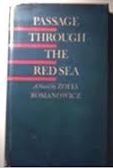Passage Through the Red Sea
Zofia Romanowiczowa

Survival is a particular form of exile. We are all survivors, says Zofia Romanowicz, who dissects the reality of survival, namely the destruction of familiar places and objects, the loss of loved ones, and the resulting inner dimension of exile. Characters pick up the pieces of their broken lives, seeing their new human and physical environment with the eyes of otherness, with the kind of innocence that makes them appear confused or lost. They have to decipher new life codes, which makes it difficult for them to relate to others or to feel ‘at home.’ Can otherness be overcome? Most of the time, Zofia Romanowicz’s answer is no.
One day belonging, the next an outsider, an exile is never safe from feeling or being excluded. The only relationships possible are with places or people who allow intense and immediate bonding, Eden recreated for intense yet brief moments always broken by violent and sudden separation – God’s wrath in the garden of Eden, the Gestapo raid, the police’s midnight knock on the door, or the mentor figure’s unexpected anger. Exiles achieve often no more that virtual social life, being thrown back into loneliness, because innocence and spontaneity were broken when the original sin was committed. What are those recreated Edens?
Cafes as places of instant fleeing togetherness, closed, complete universes with their rituals (black coffee and cigarettes) and their memory; the Cevennes as a nurturing, stable, secluded world; domesticity as dreamed comfort, coveted security observed from the outside; language as healing agent, since naming shows the power of life over death; and finally the ritual of food – exorcism of destruction, central to post-traumatic life, nurturing new memories rooted in the concrete, elemental world of everyday necessities ’ Alice-Catherine Carls, The Polish Review, Vol. 47, No. 1 (2002), pp. 3-10
—
‘very superior’ ~ Barbara Grier
Check for it on:
Details
| Genre | Fiction |
| Publication Date | 1962 |
| Publisher | Harcourt, Brace & World |
| Format | Hardcover |
| No. of Pages | 151 |
| LoC Classification | PZ4.R7644 .Pas2 |
| Language | English |
| Rating | Good |
| Original Title | Przejscie przez Morze Czerwone |
| Original Language | |
| BookID | 9619 |
